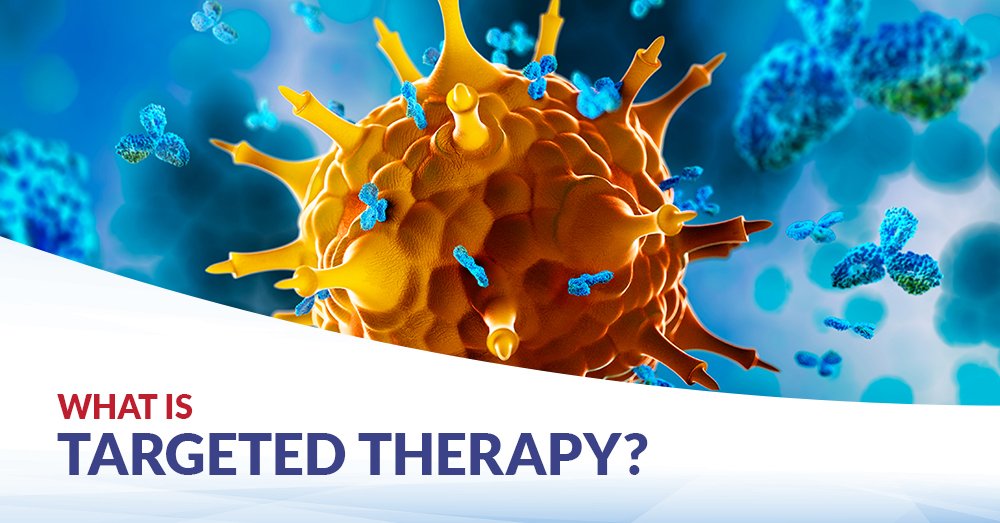Targeted Therapy: Precision Treatment for Cancer
Targeted therapy is an advanced treatment method that specifically targets cancer cells without harming normal healthy cells. Unlike traditional treatments like chemotherapy and radiation, which treat all rapidly dividing cells, targeted therapy aims to interrupt the growth and spread of cancer cells by focusing on the molecules that cause cancer cell growth. At Healtour Solutions, we connect you with the best oncologists and hospitals in India that offer personalized, advanced targeted therapy options.
Types of Targeted Therapy
Monoclonal Antibodies
- Definition: Monoclonal antibodies are laboratory-made molecules that can bind to specific targets on cancer cells.
- Purpose: These antibodies either block the signals that allow cancer cells to grow or mark them for destruction by the immune system.
Tyrosine Kinase Inhibitors (TKIs)
- Definition: TKIs are drugs that block the signals that cancer cells need to grow and divide.
- Purpose: Used to treat cancers like chronic myelogenous leukemia (CML), non-small cell lung cancer (NSCLC), and some types of breast cancer.
Proteasome Inhibitors
- Definition: These drugs block proteasomes, the protein complexes responsible for degrading damaged or unneeded proteins within cancer cells.
- Purpose: Commonly used for cancers such as multiple myeloma and certain lymphomas.
Angiogenesis Inhibitors
- Definition: These drugs prevent the formation of new blood vessels (angiogenesis) that supply tumors with nutrients and oxygen.
- Purpose: Used to treat various cancers, including colon and kidney cancers.
Hormone Therapy
- Definition: Hormone therapy blocks or lowers the amount of hormones that certain cancers need to grow.
- Purpose: Common for treating breast and prostate cancers, where hormones like estrogen or testosterone fuel tumor growth.
Benefits of Targeted Therapy
- Precision Treatment: Targeted therapy precisely targets cancer cells, minimizing harm to healthy cells, and reducing side effects.
- Fewer Side Effects: Unlike traditional therapies such as chemotherapy, targeted therapy causes fewer and less severe side effects.
- Effective for Specific Cancers: Particularly effective for cancers with known molecular mutations or specific markers that can be targeted.
- Improved Survival Rates: Some types of cancer can be treated more effectively with targeted therapy, improving long-term survival rates.
- Combines with Other Therapies: Targeted therapy can be combined with other cancer treatments like chemotherapy or radiation for enhanced results.
Symptoms of Cancer That May Indicate the Need for Targeted Therapy
Targeted therapy is often recommended for cancers that show specific genetic mutations or biomarkers, such as:
- Unexplained weight loss
- Persistent pain or swelling
- Lumps or masses, especially in organs like the breast, prostate, or lungs
- Unexplained fatigue or weakness
- Symptoms related to specific cancers, such as difficulty swallowing, coughing, or changes in bowel movements
Causes of Cancer That Might Require Targeted Therapy
Targeted therapy is useful for cancers caused by:
- Genetic Mutations: Changes or mutations in genes that control cell growth can lead to cancer. Targeted therapies work by interfering with these mutations.
- Specific Biomarkers: Certain cancers may have biomarkers (e.g., HER2 in breast cancer or EGFR mutations in lung cancer) that allow targeted treatments to be effective.
- Overactive Growth Signals: Some cancers produce excessive amounts of proteins that promote uncontrolled cell growth, which can be inhibited by targeted therapy.
Targeted Therapy Treatment Process
Consultation and Diagnosis
The first step involves meeting with an oncologist to discuss your cancer type and determining whether targeted therapy is appropriate based on the molecular characteristics of your cancer. Diagnostic tests, such as genetic testing or biomarker profiling, may be performed to guide this decision.
Personalized Treatment Plan
Once diagnosed, your oncologist will tailor a targeted therapy treatment plan based on your cancer's molecular profile and the available targeted drugs. The treatment plan will detail the drug(s) to be used, the frequency of treatment, and any combination with other therapies.
Treatment Administration
Targeted therapy can be administered through various methods, such as oral pills or intravenous (IV) infusion, depending on the type of therapy prescribed. The number of sessions varies based on cancer type and treatment plan.
Monitoring and Follow-up
Frequent monitoring through blood tests, imaging, and clinical exams will track the effectiveness of the treatment and check for potential side effects. If necessary, adjustments will be made to ensure optimal results.
Post-Treatment Care
Follow-up appointments after treatment will assess recovery, manage any side effects, and check for recurrence or spread of the cancer.
Side Effects of Targeted Therapy
While targeted therapy has fewer side effects than traditional treatments, it can still cause some adverse reactions, including:
- Fatigue: A common side effect that can affect day-to-day activities.
- Skin Reactions: Rashes, dryness, or redness at the injection or pill intake site.
- Digestive Issues: Nausea, vomiting, and diarrhea may occur.
- High Blood Pressure: Some types of targeted therapy can elevate blood pressure.
- Increased Risk of Infections: As the immune system may be affected, there's a risk of infections during treatment.
- Liver or Heart Problems: Some targeted therapies can cause liver or heart toxicity, which requires monitoring.
Fortunately, these side effects are often manageable with proper care, and many patients experience minimal discomfort.
Why Choose Healtour Solutions for Targeted Therapy in India?
- Expert Oncologists: Healtour Solutions connects you with top oncologists specializing in targeted therapies for a wide range of cancers.
- Affordable Care: Targeted therapy in India is available at a fraction of the cost compared to other countries, making it an accessible treatment option.
- State-of-the-Art Hospitals: We work with leading cancer centers in India that offer advanced targeted therapy treatments, equipped with the latest technology.
- Comprehensive Support: Healtour Solutions provides full support from initial diagnosis and treatment planning to post-treatment care, ensuring a seamless experience for international patients.
Step-by-Step Guide to Targeted Therapy Treatment
- Initial Consultation and Diagnosis:
Meet with a skilled oncologist to discuss your cancer type and get genetic or biomarker testing to determine if you qualify for targeted therapy.
- Personalized Treatment Plan:
Based on the results of tests and your cancer’s characteristics, a customized treatment plan will be created, outlining the drugs and treatment frequency.
- Targeted Therapy Sessions:
Your oncologist will administer the prescribed targeted therapy either through oral pills or an intravenous infusion, depending on the plan.
- Monitoring and Adjustments:
Regular follow-ups will monitor the treatment’s effectiveness and identify any side effects. Adjustments to the treatment plan will be made as necessary.
- Post-Treatment Care:
After completing treatment, follow-up visits will help manage recovery, address side effects, and check for any signs of recurrence.
Contact Us for Targeted Therapy Treatment
If you're considering targeted therapy for cancer, Healtour Solutions can help you connect with the top oncologists and hospitals in India. Our team offers affordable, personalized care with advanced treatment options tailored to your needs. Contact us today to learn more about targeted therapy and how we can assist you in your cancer journey.
FAQs About Targeted Therapy
1. What is targeted therapy?
Targeted therapy is a treatment that specifically targets cancer cells by interfering with molecules involved in cancer cell growth.
2. How is targeted therapy different from chemotherapy?
Chemotherapy kills all rapidly dividing cells, while targeted therapy specifically targets cancer cells with fewer side effects.
3. Is targeted therapy effective for all cancers?
Targeted therapy is particularly effective for cancers with specific genetic mutations or biomarkers.
4. What are the side effects of targeted therapy?
Side effects may include fatigue, skin reactions, digestive issues, and elevated blood pressure, but they are generally milder than chemotherapy.
5. How long does targeted therapy take?
Treatment duration varies depending on cancer type and treatment response.
6. Can targeted therapy cure cancer?
In some cases, targeted therapy can cure cancer or improve long-term survival, especially for cancers with specific genetic mutations.
7. How is targeted therapy given?
It can be administered orally or through an intravenous (IV) infusion, depending on the drug.
8. Is targeted therapy safe?
Yes, it is generally safe, but side effects may occur, which can be managed with medical supervision.
9. How much does targeted therapy cost in India?
The cost typically ranges from $3,500 to $12,000, depending on the type of cancer and drugs used.
10. Can targeted therapy be combined with other treatments?
Yes, targeted therapy is often combined with other treatments like chemotherapy or radiation for better outcomes.



